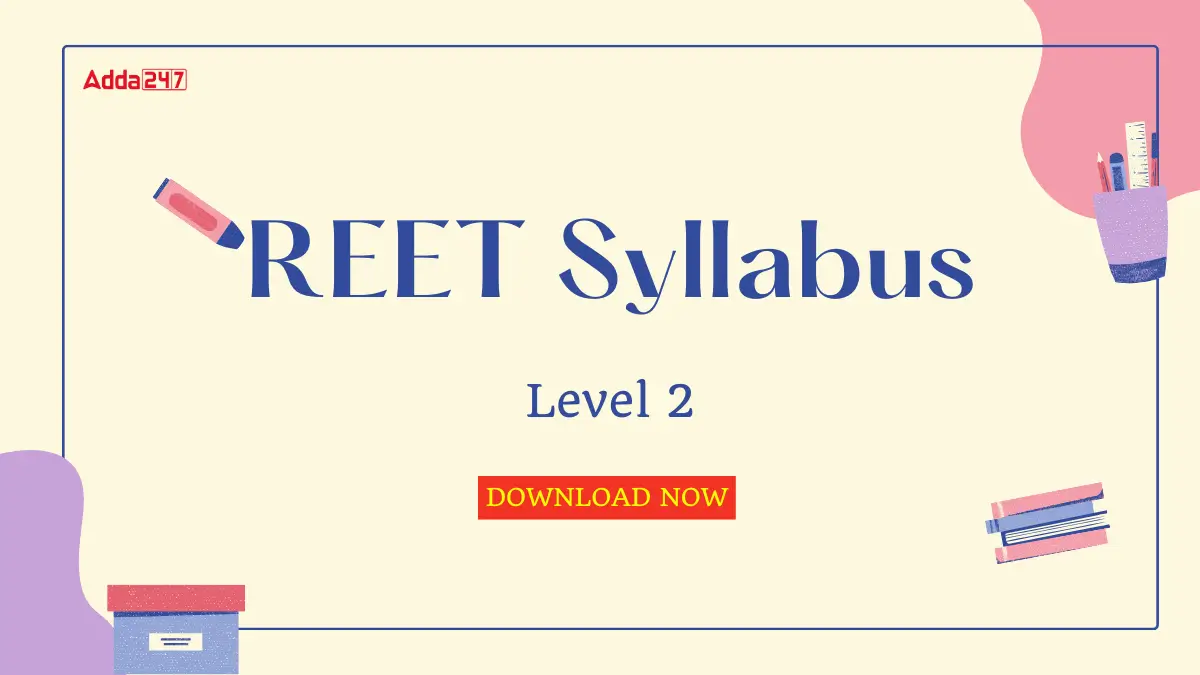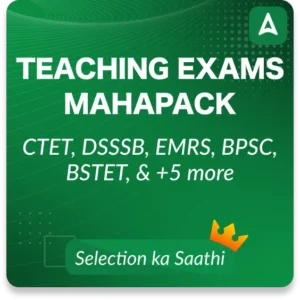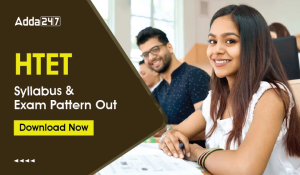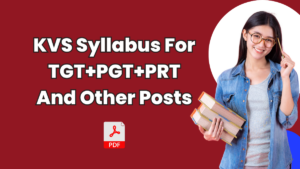Table of Contents
REET Syllabus 2025 has been released by the Board of Secondary Education, Rajasthan (BSER) along with the notification on the official website. Candidates preparing for the REET Level 2 Exam 2025 must check out the syllabus for REET Level 2 for better preparation for Exams. They should read through the REET Level 2 Syllabus 2025 which covers essential topics that will help candidates prepare effectively for the exam. Aspirants can access the complete REET syllabus for both levels through the article below for a structured and comprehensive study plan.
REET Level 2 Syllabus 2025
The REET Level 2 Syllabus 2025 outlines the exam structure for aspiring REET Level 2 Aspirants. Conducted by the Board of Secondary Education, Rajasthan (BSER), the exam is scheduled for 27 February and 28 February 2025 and consists of two levels—Level 1 for primary teachers and Level 2 for upper primary teachers. Each level comprises 150 questions, carrying 150 marks, with no negative marking for incorrect answers. However, 1/3 marks will be deducted for unattempted questions. The selection process includes a written exam followed by document verification. Candidates can check the official syllabus and updates on www.rajeduboard.rajasthan.gov.in.
| REET Syllabus 2025 – Highlights | |
|---|---|
| Name of the Board | Board of Secondary Education, Rajasthan |
| Name of the posts | Grade III Teacher |
| Examination Name | Rajasthan Eligibility Exam For Teachers (REET 2024) |
| Category | Exam Pattern & Syllabus (New) |
| REET Exam Date 2025 | 27 February and 28 February 2025 |
| Papers | Level 1 paper & Level 2 Paper |
| Nature of Exam | Qualifying |
| Total Questions | 150 (each level) |
| Total Marks | 150 (each level) |
| Negative Making |
|
| Official Website | www.rajeduboard.rajasthan.gov.in |
REET Level 2 Exam Pattern
The REET Paper 2 is aimed at candidates who wish to teach at the elementary stage for Classes VI to VIII. This paper consists of a total of 150 questions, with each question worth one mark, totalling 150 marks. It is structured into four subjects: Child Development and Pedagogy (30 questions), Language I (compulsory, 30 questions), Language II (compulsory, 30 questions), and a combined section on Mathematics & Science, Social Studies/Social Science, or Any Other Subject (60 questions). This format allows candidates to increase their knowledge and understanding of child development, pedagogical strategies, and subject-specific expertise, essential for effectively teaching upper elementary students.
| S.No. | Subjects | No. of Questions | Marks |
|---|---|---|---|
| 1 | Child Development and Pedagogy | 30 | 30 |
| 2 | The language I (compulsory) | 30 | 30 |
| 3 | Language II (compulsory) | 30 | 30 |
| 4 | Mathematics & Science Or Social Studies/Social Science Or Any Other Subject |
60 | 60 |
| Total | 150 | 150 |
REET Level 2 Syllabus 2025
The REET Level 2 Syllabus 2025 covers a comprehensive range of subjects designed to prepare candidates for teaching students in grades 6 to 8. The syllabus includes essential topics such as Child Development and Pedagogy, Language-I, Language-II, Mathematics, and specialized subjects like Science or Social Studies. These subjects are carefully selected to ensure that candidates are well-equipped with the knowledge and skills required for effective teaching at the middle school level. For a detailed breakdown of the REET Level 2 Syllabus, candidates should refer to the official REET Syllabus 2025, which provides in-depth information on each subject area and its corresponding topics.
REET Level 2 Syllabus: Child Development & Pedagogy
The REET 2025 Child Development & Pedagogy syllabus, mainly focuses on understanding child development from birth to adolescence, various learning theories, effective teaching methods, assessment techniques, and child psychology. It emphasizes child-centred education, inclusivity, and catering to diverse learning styles.
- Child Development: Concept of growth and development, Principles and dimensions of development. Factors affecting development (especially in the context of family and school) and its relationship with learning.
- Role of Heredity and Environment
- Meaning and Concept of learning and its processes. Factors Affecting learning
- Theories of learning (Behaviourism, Gestalt, Cognitivism, Constructivism) and their implications
- How children learn, Learning process, Reflection, Imagination, Argument, constructivism, experiential learning, concept mapping, investigatory, approach, problem-solving
- Motivation and Implications for Learning
- Individual Differences:- Meaning, Types, and Factors Affecting Individual Differences Understanding individual differences.
- Personality:- Concept and types of personality, Factors responsible for shaping it, and Its measurement
- Intelligence:- Concept, Theories, and its measurement. Multidimensional Intelligence and Its Implication.
- Understanding diverse learners:- Backward, Mentally retarded, gifted, creative, disadvantaged and deprived, specially-abled, CWSN, children with learning disabilities
- Learning Difficulties.
- Adjustment:- Concept and ways of adjustment. Role of teacher in the adjustment.
- Teaching-learning process, Teaching learning strategies and methods in the context of National Curriculum Framework 2005.
- Meaning and purposes of Assessment, Measurement, and Evaluation. Comprehensive and Continuous Evaluation. Construction of Achievement Test, Learning outcomes
- Action Research.
- Right to Education Act 2009 (Role and Responsibilities of Teachers)
- National Education Policy (2020) (New)
- Early Childhood Care and Education (New)
- Foundational Literacy and Numeracy (New)
- Curriculum and Pedagogy in Schools (New)
- Teacher (New)
- Equitable and Inclusive Education (New)
- Standard-setting and Accreditation (New)
- Contemporary Child Welfare Educational Schemes of Rajasthan (New)
REET Level 2 Syllabus: Mathematics
REET Level 2 exam mainly caters to upper primary teacher posts. Candidates must have a thorough understanding of Mathematics topics covered in classes 6 to 10.
- Indices: Multiplication and division of numbers on equal bases, Laws of Indices.
- Algebraic expressions: Addition, Subtraction, Multiplication and Division, Identities
- Factors: factors of simple algebraic expressions
- Equations: Simple linear equation.
- Square & Square Root
- Cube & Cube Root
- Interest: Simple interest, Compound interest, Profit – Loss.
- Ratio and Proportion: Division into proportional parts and fractions.
- Percentage: Birth and Death rate, Population growth, Depreciation
- Lines and Angles: Line segment, straight and curved lines, and types of angles.
- Plane figures: Triangles, Congruence of Triangles, Quadrilaterals, and Circle.
- Area and Perimeter of Plane figure Triangles, Rectangles, Parallelograms, and Trapeziums.
- Surface Area and Volume: cube, cuboid, and right circular cylinder.
- Statistics: collection and classification of data, frequency distribution table, Tally marks, bar graph and histogram, circular graph (Pai diagram).
- Graph: Various types of graphs.
- Probability
- Nature of Mathematics/Logical Thinking
- Place of Mathematics in Curriculum
- Language of Mathematics
- Community Mathematics
- Evaluation
- Remedial Teaching
- Problems of Teaching
- Decimals (New)
- Rational Numbers (New)
- Symmetry (New)
REET Level 2 Syllabus – Science
REET Aspirants may find all the relevant topics for studies which is asked in the REET Level 2 Exam in this article. Check out the REET Syllabus 2025 for Science Subject.
- Living & Non-Living: Introduction, Differences, and Characteristics
- Micro-organisms: Bacteria, viruses, fungi (Beneficial & Harmful)
- Living Being: different types and parts of plants, nutrition in plants, respiration and excretion, plant cell and animal cell- their structure and Function, Cell Division
- Human body and health: Diseases spread by micro-organisms, (tuberculosis, measles, diphtheria, cholera, typhoid); prevention from diseases; different systems of the human body; infectious diseases (reasons of spreading and prevention); Sources of Food, Major components of food and diseases developed due to their deficiency; Balanced diet;
- Animal Reproduction and Adolescence: Methods of Reproduction; Sexual and asexual. Adolescence and puberty: Changes in the body, the role of hormones in reproductions, Reproductive health
- Mechanics- Force and Motion, Types of forces- (muscular force, frictional force, gravitational force, magnetic force, electrostatic force), Pressure, Types of motion (linear, zigzag, circular, vibrating, periodic) speed. Atmospheric Pressure Buoyancy force, work, and energy, traditional and alternative sources of energy, energy conservation
- Heat and Temperature: Heat and Temperature mean, thermometers, Heat Transmission (conduction, convection, and radiation).
- Light & Sound: Sources of light, the reflection of light, Spherical mirrors, Image formation by plane and Spherical Mirrors, Refraction of Light, Lenses and Image formation by Lenses, Sound, Characteristics of sound, Sound propagation, and sound pollution.
- Electricity and magnetism- Electric Current, Electric Circuit, Heating, magnetic and Chemical effects of current, magnet and magnetism.
- Science and Technology: Importance of science in daily life; Synthetic Fibers & Plastics-Types and characteristics of synthetic fibers. Plastic and its properties, Plastic and environment, detergents, cement, etc.; Science and Technology in the medical field (X-ray, C.T. Scan, Surgery, Ultrasound, and LASER): In the field of Telecommunication – general information about the fax machine, computer, internet, e-mail, and website.
- Solar System: Moon and stars, Solar family-Sun and Planets, Comets, Constellation
- Structure of Matter: Atom and molecule; structure of the atom; element, compound, and mixture; separation of impurities of substances; symbols of elements, chemical formulae of compounds and chemical equations, physical and chemical change.
- Chemical Substances: Oxides, greenhouse effect and global warming, Hydrocarbon (Introductory knowledge), Acid, Alkali and Salt, Oxygen gas, Nitrogen gas, and nitrogen cycle, Coal, Petroleum, and natural gas
- Nature & Structure of Sciences
- Natural Science: Aims & objectives, Natural resources, Environment, Pollution and Control, Biodiversity, adaptation, waste management.
- Agriculture Management: Agriculture Practices, Major crops are grown in Rajasthan
- Organic Evolution
- Understanding the Science
- Methods of Science Teaching
- Innovation
- Text Material/Aids
- Evaluation
- Problems
- Remedial Teaching
- Energy- Traditional and alternative sources of energy and energy conservation (New)
- Natural Phenomenon- Lighting and Earthquake (New)
- Conservation of Plants and Animals- Deforestation, Greenhouse Effects, and Global Warming, Endangered Species, Wildlife Sanctuaries and National Parks. (New)
REET Level 2 Syllabus Of Language I
(A) Hindi Language (L1)
- एक अपठित गद्यांश में से निम्नलिखित व्याकरण संबंधी प्रश्न :-
शब्द ज्ञान, तत्सम, तद्भव, देशज, विदेशी शब्द । पर्यायवाची, विलोम, एकार्थी शब्द । उपसर्ग, प्रत्यय, संधि और समास । संज्ञा, सर्वनाम, विशेषण, अव्यय ,वाक्यांश के लिए एक शब्द, शब्द शुधि।
- एक अपठित गद्यांश में से निम्नलिखित बिंदुओं पर प्रश्न :-
रेखांकित शब्दों का अर्थ स्पष्ट करना, वचन, काल, लिंग ज्ञात करना। दिए गए शब्दों का वचन काल और लिंग बदलना।राजस्थानी शब्दों के हिंदी रूप
- वाक्य रचना, वाक्य के अंग, वाक्य के प्रकार, पदबंध, मुहावरे और लोकोक्तियाँ,विराम चिन्ह।
- भाषा की शिक्षण विधि, भाषा शिक्षण के उपागम, भाषा दक्षता का विकास।
- भाषायी कौशलों का विकास (सुनना, बोलना, पढ़ना, लिखना) हिंदी भाषा शिक्षण में चुनौतियाँ, शिक्षण अधिगम सामग्री, पाठ्य पुस्तक, बहु-माध्यम एवं शिक्षण के अन्य संसाधन।
- भाषा शिक्षण में मूल्यांकन, उपलब्धि परीक्षण का निर्माण समग्र एवं सतत् मूल्यांकन, उपचारात्मक शिक्षण।
- राजस्थानी भाषा और साहित्य की सामान्य जानकारी। (New)
(B) REET Syllabus Of English Language ( L1)
- Unseen Prose Passage
Synonyms, Antonyms, Spellings, Word-formation, One Word Substitution
- Unseen Prose Passage
Parts of Speech, Tenses, Determiners, Change of Degrees
- Framing Questions Including Wh-questions, Active and Passive Voice, Narration, Knowledge of English Sounds and Phonetic Symbols
- Principles of Teaching English, Methods, and Approaches to English Language Teaching
- Development of Language Skills, Teaching Learning Materials: Textbooks, Multi-media Materials, and other resources
- Continuous and Comprehensive Evaluation, Assessment, and Evaluation in Language.
REET Level 2 Syllabus Of Language II
(A) Hindi Language (L2)
- एक अपठित गद्यांश आधारित निम्नलिखित व्याकरण संबंधी प्रश्न :-
वर्ण विचार, वर्ण विश्लेषण, शब्द ज्ञान, तत्सम, तद्भव, देशज, विदेशी शब्द । युग्म शब्द,उपसर्ग, प्रत्यय, संधि, समास, शब्दों को शब्द कोष क्रम में लिखना, शब्दों के मानक रूप में लिखना, संज्ञा, सर्वनाम, विशेषण, क्रिया, क्रिया विशेषण, लिंग, वचन, काल ।
- एक अपठित पद्यांश पर आधारित निम्नलिखित बिंदुओं पर प्रश्न
भाव सौंदर्य, विचार सौंदर्य, नाद सौंदर्य, शिल्प सौंदर्य, जीवन दृष्टि
- वाक्य रचना, वाक्य के अंग, वाक्य के भेद, पदबंध, मुहावरे, लोकोक्तियाँ। कारक चिह्न, अव्यय, राजस्थानी मुहावरों का अर्थ व प्रयोग , विराम चिन्ह
- भाषा शिक्षण विधि, भाषा शिक्षण के उपागम, भाषायी दक्षता का विकास ।
- भाषायी कौशलों का विकास (सुनना, बोलना, पढ़ना, लिखना) शिक्षण अधिगम सामग्री-पाठ्य पुस्तक, बहु-माध्यम एवं शिक्षण के अन्य संसाधन।
- भाषा शिक्षण में मूल्यांकन, (सुनना, बोलना, पढ़ना, लिखना) उपलब्धि परीक्षण का निर्माण, समग्र एवं सतत् मूल्यांकन, उपचारात्मक शिक्षण।
(B) English Langauge (L2)
- Unseen Prose Passage: Linking Devices, Subject-Verb Concord, Inferences
- Unseen Poem: Identification of Alliteration, Simile, Metaphor Personification, Assonance, Rhyme
- Modal Auxiliaries, Common Idioms, and Phrases, Literary Terms: Elegy, Sonnet, Short Story, Drama
- Basic knowledge of English Sounds and their Phonetic Transcription
- Principles of Teaching English, Communicative Approach to English Language Teaching, Challenges of Teaching English: Language Difficulties( role of home language multilingualism)
- Methods of Evaluation, Remedial Teaching
REET Syllabus Of Social Studies
The Social Studies section in REET Pre Syllabus Level 1 and REET Pre Syllabus Level 2 typically cover primary and upper primary level topics in history, geography, civics, and pedagogical aspects of teaching social studies.
- Indian Civilization, Culture, and Society – Indus Valley civilization, Vedic culture, Jainism and Buddhism, Mahajanpadas
- Mauryan & Gupta Empires and Post-Gupta Period –Political history & administration, contribution to Indian culture, India (600-1000 AD), Greater India
- Medieval and Modern Period –The Bhakti and Sufi Movement, Mughal-Rajput relations; Mughal administration, British policies towards Indian states, Revolt of 1857, Impacts of British Rule on Indian Economy, Renaissance and Social reforms, Indian National Movement (1885-1947)
- Indian Constitution and Democracy – Making of the Indian Constitution and its features, Preamble, Fundamental Rights and Fundamental Duties, Social justice, Child Rights and Child Protection, Election in Democracy and Voters Awareness.
- Government: Composition and Functions –Parliament, President, Prime Minister, and Council of Ministers; Supreme Court, State Government, Panchayati Raj, and Urban Self-Government. (about Rajasthan) District Administration and Judicial System.
- Earth and Our Environment – Latitude, Longitude, Earth`s Movement, Air Pressure and winds, Cyclone and Anti-cyclone, Solar and Lunar Eclipse, Major climate zone of the earth, Biosphere, Environmental Problems, and Their Solutions
- Geography and Resources of India – Physiographic regions, Climate, Natural vegetation, wildlife, Multipurpose River-valley projects, Soil, Agriculture crops, Industries, Minerals, Transportation, Population, and Human Resources. Economic and Social Programmes of Development
- Geography and Resources of Rajasthan – Physical regions, Climate, and drainage system, Lakes, Water conservation and Harvesting, Agriculture, Soil, Crops, Minerals, and Energy Resources, Major Canales and River-valley projects of Rajasthan, Transport, Industries, Population, Tourist Places of Rajasthan, Forest, and wildlife
- History of Rajasthan – Ancient Civilizations and Janpadas, History of major dynasties of Rajasthan, Contribution of Rajasthan in the revolt of 1857, Prajamandal, Tribal’s and Peasant Movement in Rajasthan an, Integration of Rajasthan, Major Personalities of Rajasthan.
- Art and Cultural of Rajasthan – Heritage of Rajasthan (Forts, Palaces, Monuments ) Fairs, Festivals, Folk-arts of Rajasthan, Painting of Rajasthan, Folk dance and folk Drama of Rajasthan, Lok- Devta, Lok Saint, Folk Music and Musical Instruments of Rajasthan, Handicrafts, and architecture of Rajasthan, Dresses, and Ornaments of Rajasthan, Languages, and Literature of Rajasthan.
- Insurance and Banking System – Types of Insurance and Bank, Reserve Bank of India and its Functions, Cooperatives and Consumer Awareness
- Pedagogical Issues – I Concept & Nature of Social Science/Social Studies; Class Room Processes, Activities, and Discourse; Problems of teaching Social Science/Social Studies; Developing critical thinking.
- Pedagogical Issues – II Enquiry/Empirical Evidence; Teaching Learning Material and Teaching Aids, Information and Communication Technology. Project Work, Learning Outcomes, Evaluation.
REET Syllabus Level 1 & II PDF
The REET syllabus for both levels is conveniently available in PDF format on the official website of the Board of Secondary Education, Rajasthan (BSER). Aspiring teachers can easily access the REET Level 1 and REET Syllabus Level 2, providing a detailed roadmap for their exam preparation. The REET Syllabus Level 1 focuses on Child Development and Pedagogy, Languages (Hindi and English), Mathematics, and Environmental Studies, aiming to build a solid foundation for teaching children in grades 1 to 5. On the other hand, the REET Syllabus Level 2 delves into specialized subjects such as Science or Social Studies, along with Child Development and Pedagogy, Mathematics, and Languages, preparing candidates to teach students in grades 6 to 8.
- The REET Syllabus Level 2 dives deeper into specific subjects like Science or Social Studies, along with Child Development and Pedagogy, Mathematics, and Languages. REET level 2 prepares candidates for teaching grades 6 to 8.
| REET Syllabus Level 2 PDF Download |
||
| REET Syllabus Level 2 (In Hindi) | Download in Hindi | Download REET New Syllabus Level 2 |
| REET Syllabus Level 2 (In English) | Download in English | |
| REET Exam Important Links | |
| REET Eligibility Criteria | REET Answer Key 2025 |
| REET Previous Year Question Paper | REET Result 2025 |
| REET Result 2025 | REET Cut Off Marks |




 HTET Syllabus 2026 (PRT, TGT, PGT), Chec...
HTET Syllabus 2026 (PRT, TGT, PGT), Chec...
 KVS PGT Syllabus 2025, Download PGT Syll...
KVS PGT Syllabus 2025, Download PGT Syll...
 KVS Syllabus 2025 For PRT, TGT, PGT and ...
KVS Syllabus 2025 For PRT, TGT, PGT and ...












